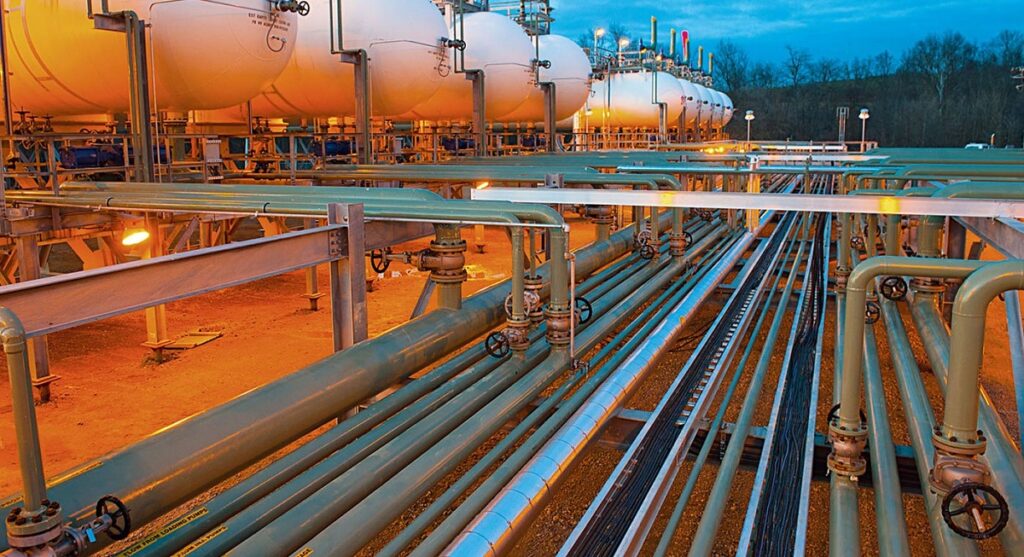- Africa’s natural gas reserves are estimated at 620 trillion cubic feet. Nigeria, Algeria, and Senegal have the most extensive deposits.
- Algeria is Africa’s foremost natural gas exporter. It is also a potential bridge to Europe’s energy reliance, with existing trans-Mediterranean gas pipelines and upcoming projects.
- On a global scale, there is rising demand for natural gas, and Africa, with its substantial resources, must actively participate.
The recent formalization of an agreement to advance what is being hailed as South Africa’s most substantial liquefied natural gas (LNG) endeavor in the Mpumalanga province underscores the potential of natural gas as a viable energy source for the nation.
This accord, described as a “non-binding term sheet,” represents a collaboration between South Africa’s Industrial Development Corporation (IDC) and Afro Energy. The latter is a subsidiary of the Australian gas exploration company Kinetiko Energy.
The project is expected to produce 50MW of equivalent energy initially. There are plans to scale up to 500MW over time. Additionally, there are prospects for developing further LNG projects that match this capacity.
Vast gas reserves across Africa
This development is crucial as South Africa grapples with an ongoing power crisis. The enthusiasm for onshore gas exploration has been rekindled. Already, TotalEnergies has gotten approval for oil and gas exploration off South Africa’s western coast. In May, South Africa announced intentions to reconsider shale gas exploration in the Karoo region.
The Mpumalanga discovery represents a relatively advanced project characterized by an innovative public-private partnership approach. Nonetheless, the resource, estimated at 3.1 billion cubic feet of natural gas, pales compared to the vast gas reserves in other African regions.
Across Africa, natural gas reserves average 620 trillion cubic feet, with the most substantial deposits in Nigeria, Algeria, and Senegal.
Due to its proximity to Europe and well-established LNG infrastructure, Algeria is Africa’s foremost natural gas exporter. It ranks as the fourth-largest global gas exporter, backed by the tenth-largest proven natural gas reserves worldwide.
In light of Europe’s efforts to reduce its reliance on Russian energy sources following the Ukraine crisis, North and West Africa are strategically positioned to bridge this gap. Existing trans-Mediterranean gas pipelines can facilitate this; additional pipeline projects are in the planning stages.
Potential for African oil and gas exports
The potential for African oil and gas exports to Europe is immense. Authorities must, however, fix supply bottlenecks and present political challenges.
Natural gas is often termed “transition fuel” that can aid in the shift away from oil and coal towards renewable energy sources. By certain metrics, gas is a cleaner-burning, efficient fuel that emits fewer carbon dioxide emissions than other fossil fuels.
Gas is abundant and can be compressed, liquefied, and stored, offering an advantage over renewable energy sources like solar and wind, which are less efficiently dispatchable. Keeping and providing renewable energy when needed requires supplementary technologies such as batteries, hydrogen, or pumped storage.
Gas resources can seamlessly integrate into the well-established global natural gas infrastructure through pipelines and international shipping. This means emerging natural gas territories like South Africa could swiftly connect to this system and supply gas shortly after field development.
Ghana serves as an instructive case study of what’s achievable. The country’s oil and gas industry commenced with initial discoveries around 2006 and successfully produced its first product within 40 months. In 2021, Ghana had 2.4 million metric tons of gas.
Also Read: Harnessing wave energy to fix Africa’s electricity crisis
Much of Africa lacks access to electricity
Balancing the imperative to reduce global greenhouse gas emissions to meet the commitments of the Paris Agreement with Africa’s development needs is a critical challenge. Nearly half of Africa’s population still needs access to electricity. The Africa Energy Commission affirms that natural gas retains a role in the continent’s evolving energy mix.
In a context where Africa is responsible for only four percent of global carbon emissions, and most of its population relies on biomass for energy, transitioning to natural gas would represent a net improvement.
On a global scale, there is a burgeoning demand for natural gas. With its substantial resources, Africa must actively participate profitably in this market.
The continent’s energy leaders will convene to explore emerging energy opportunities at Africa Oil Week. The forum, recognized as “Africa’s premier upstream event,” occurs from October 9-13 in Cape Town.
This event serves as a global platform for deals and transactions. It brings together governments national and international oil companies. Independents, investors, and service providers will also come to advance the energy landscape in Africa.
